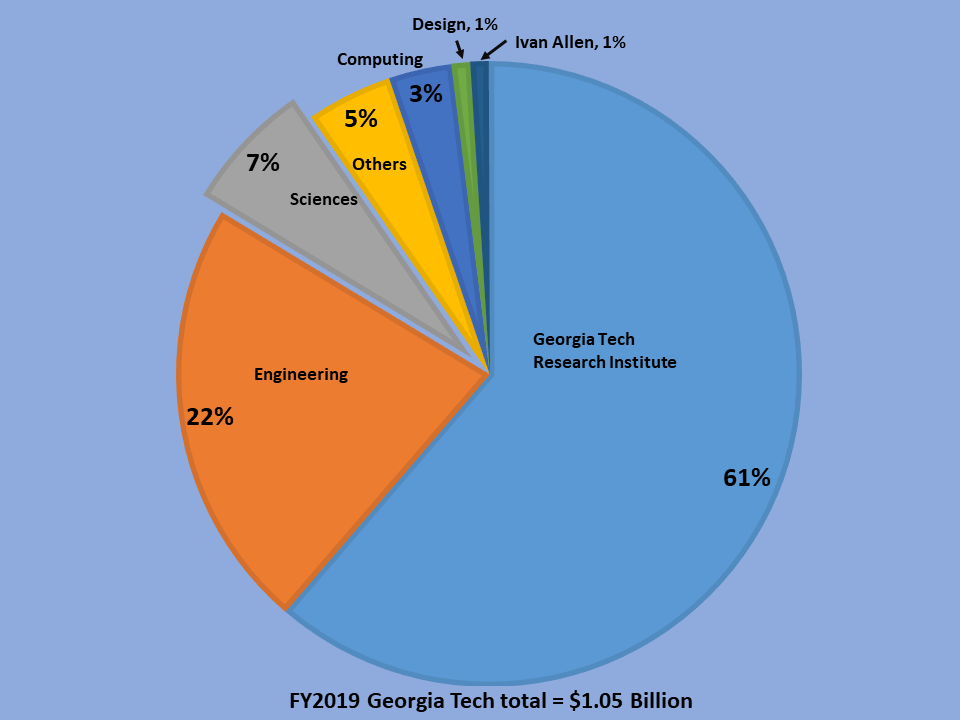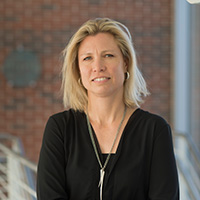College of Sciences faculty raised a historic amount of external research funding in fiscal year 2019. At $70.5 million, the FY2019 total continues the College’s steady gains in external grants for the past several years. The ability to attract research funds bodes well for the College’s research productivity, ability to train students, and opportunities for new discoveries in fundamental science for many years to come, says Associate Dean for Research Julia Kubanek.
Scientific research to discover new knowledge and solve problems is hard and costs money, says M.G. Finn, professor and chair in the School of Chemistry and Biochemistry. Results are not guaranteed. “How do we support an endeavor that has many more ‘failures’ than successes?”
External funding is essential. “It helps connect our faculty to the most important fundamental and applied problems among a limitless set of possible projects,” Finn says. “It also provides the resources to give our students the chance to fail repeatedly, and thereby learn how to succeed. Increasing funding is a good sign that we are selecting good topics to research, failing in productive ways, and ultimately succeeding in uncovering new knowledge and valued applications of that knowledge.”
The College of Sciences’ success can be attributed to two other factors. Faculty are applying for grant dollars at increasing rates, says Kubanek, who is also a professor in the Schools of Biological Sciences and of Chemistry and Biochemistry. And “we are continuing to submit to federal funding agencies high-quality proposals, despite the increase in reporting, compliance, and other requirements, thanks to staff who support principal investigators in preparing proposals and managing grants.”
“External funding is essential for our mission of providing students with an outstanding training and fostering a vibrant environment of transformative research,” says Pablo Laguna, professor and chair in the School of Physics. The school saw a dramatic rise in external funding, almost doubling from FY2018. “The rise in external funding in FY2019 reflects the commitment of my colleagues to ensure that we accomplish this mission. New awards in the areas of Astrophysics, Physics of Living Systems, and Atomic and Molecular and Optical Physics were largely responsible for this increase.”
The awards support a wide range of research activities, from exploration of Jupiter’s moon Europa (Britney Schmidt, School of Earth and Atmospheric Sciences), to algebraic geometry and extremal combinatorics (Greg Blekherman, School of Mathematics), to wearable hydration technologies (Mindy Millard-Stafford, School of Biological Sciences).
Support came mostly from public sources. For example, Nepomuk Otte received NASA funding for the project “Development of a Photon Detection Module for the Detection of Cosmogenic Neutrinos.” The project aims to develop instrumentation to detect ultra-relativistic neutrinos of astrophysical origin.
Neutrinos are elementary particles that help us understand the origin and composition of the highest energy cosmic rays. Cosmic rays are charged particles, which bombard the Earth from all directions. “Where they come from, what their composition is, and how they acquire their relativistic energies is a century-old mystery,” says Otte, who is an associate professor in the School of Physics. “One way to find out is by measuring neutrinos, which are produced by these cosmic rays. With the instrumentation developed in this project it will be possible to build new experiments that have the sensitivity to detect ultra-relativisitic neutrinos for the first time.”
Meanwhile, Vinayak Agarwal received ongoing National Institutes of Health funding for the project “Understanding Natural Production of Polybrominated Toxins and Pollutants.” Molecules bearing several bromine atoms produced naturally in marine ecosystems can harm human health and the environment. “We do not know how these molecules are made, nor the identities of their producers,” says Agarwal, who is an assistant professor in the Schools of Chemistry and Biochemistry and of Biological Sciences. This research aims to bridge these knowledge gaps and could affect public health policies to mitigate human exposure to natural harmful compounds.
For More Information Contact
A. Maureen Rouhi, Ph.D.
Director of Communications
College of Sciences






